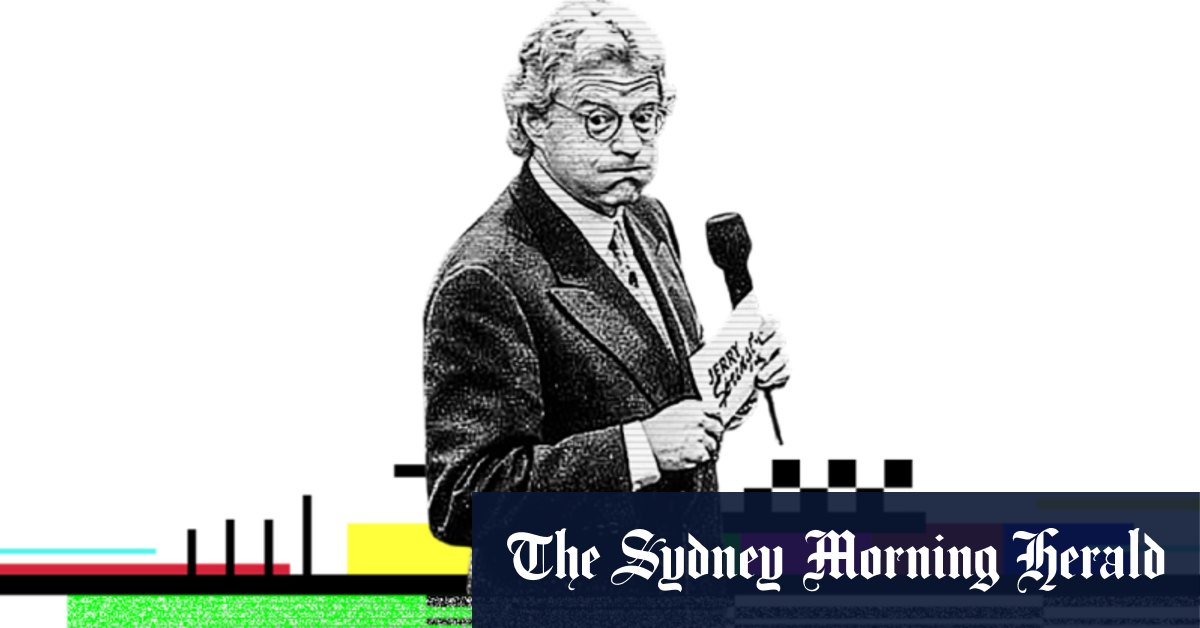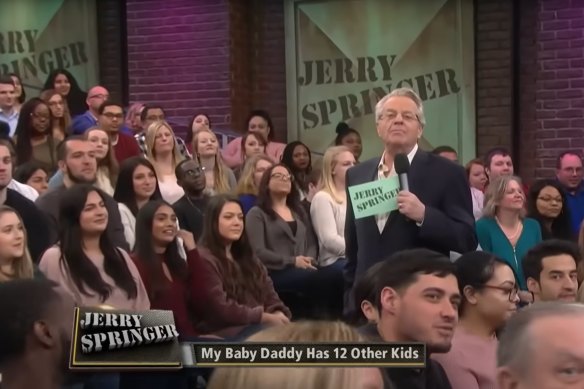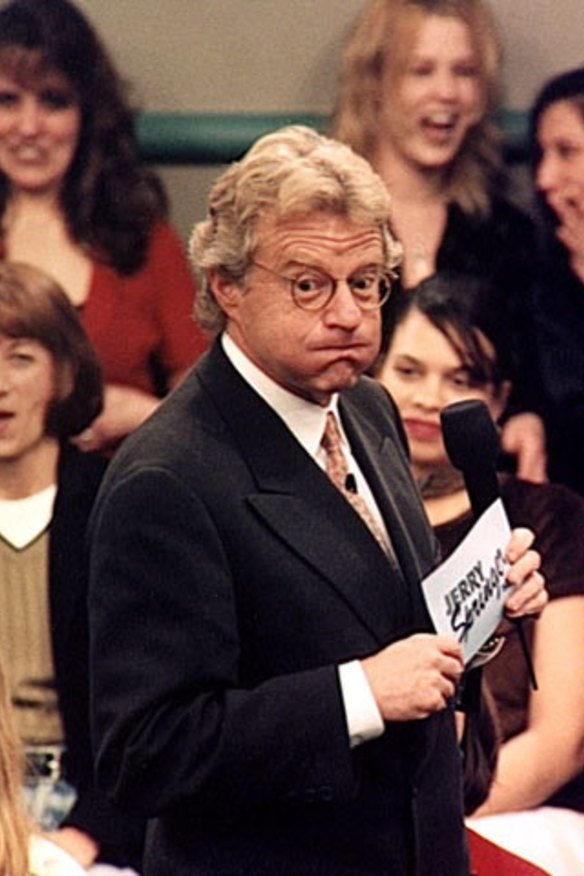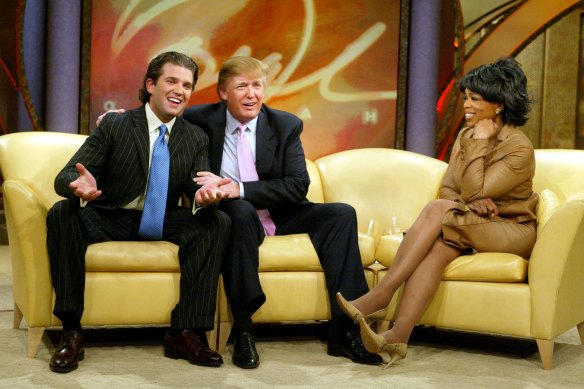
It was the beginning of the end. Perhaps that’s hyperbolic, blaming a single television show for hastening the decline of civilised discourse. But The Jerry Springer Show thrived on that kind of dramatic accusation. And its influence cannot be overestimated, even if the show was chronically underestimated at the time.
A mediocre Netflix documentary, Jerry Springer: Fights, Camera, Action falls short on basic research and pacing. Usually, it’s best to ignore a lazily assembled two-parter considering how much excellent TV beckons. Yet given how Springer’s circus changed the television landscape, and arguably society, the documentary cries out for serious consideration.

Just 12 kids? Hold my drink. Life was never easy on The Jerry Springer Show.Credit: The Jerry Springer YouTube Channel
Yes, this was the show where a man French-kissed his wife on camera – no biggie, unless your wife is a pony. The episode titled I Married a Horse proved the man’s equine love was unbridled.
Other episodes featured a woman who refused the confines of clothes, a man who wore only a nappy, and siblings who had sex. At times, it seemed any situation built on any variety of sex, especially if it could make people shudder, found its way onto the show.

Jerry Springer during a taping of his show.
The topics weren’t only sexual, they were sensational. A few titles from the show’s 3891 episodes: I Slept with 251 Men in 10 Hours!, My Wife is a Pimp, I’m Happy I Cut Off My Legs!, Uncle Stash Shot the Easter Bunny, I’m Here to Marry My Stepmom, My Baby Daddy Has 12 Other Kids and Lesbian Threesomes With Mom.
Viewers never knew whether to laugh or vomit, but cringing was inevitable. So was a growing sense that times were changing, and not for the better. Truly, there was no way to watch two women fighting over a man with a mullet and a negligible IQ, and feel hopeful about the future. Still, could anyone have realised where this ultimately would lead? The more frightening question is: Have we reached the bottom yet?
Jerry Springer: Fights, Camera, Action is as unashamedly shallow as the show it attempts to chronicle, but it’s an important reminder. Celebrating the underbelly of humanity and turning everyone into TV segments didn’t just happen spontaneously. It was a gradual cultural shift, a decline under which polite thank-you notes gave way to nasty tweets. Springer’s show was the catalyst.
What’s strangest is that Springer, by all accounts, was a mild fellow, a gentleman. His humility shines even when his guests act like hyenas on meth.
This was supposed to be a talk show, and Springer wanted to shake up the genre. He wound up hosting a fight show where talking occasionally broke out. Chairs were flung, punches were thrown and people were carted off. “Our show was chaos,” Springer acknowledged.
It was, and it led to our current baseline chaos. Sometimes, though, the medium is not the message (forgive me, Marshall McLuhan acolytes). Instead, the message is the medium.
And in this case, it changed all. Without Springer, there would be no Kim Kardashian, turning a leaked sex tape into a family industry. There would be no The Real Housewives of Sydney, Melbourne, or anywhere else, with rich women reviving the mean-girl caste system of high school and keeping plastic surgeons in sports cars.
Sure, vulgarity always existed, but so, occasionally, did shame. Is it better to have all this in the open rather than hide it? Does everyone need to know everything? Are we all that interesting? No, and we become less so at eardrum-shattering decibels.
The Springer Effect is seen today in most genres. Loveless singles court public, embarrassing rejection as they seek eternal happiness, one rose at a time. News show pundits scream over each other in this misguided belief that volume outranks facts.
Before Springer, this was not the norm. There was Oprah. While I feel awful even putting them in the same paragraph, in interviews for the documentary, Springer’s producers constantly refer to her. Sure, both series came out of Chicago and were categorised as talk shows, but they were not the same. Oprah said she was appalled by Springer’s show. To Springer’s producers, her horror was a badge of honour.

A different kind of talk show: Donald Trump Jr and Senior with Oprah Winfrey.Credit: AP
Springer’s executive producer, Richard Dominick, understood everything was fodder. His resume included writing headlines for Weekly World News, the tabloid where aliens impregnated unsuspecting Earthlings. Dominick pushed the Springer show to spotlight people who might have benefited more from intensive therapy, such as a 14-year-old prostitute or a man who had cut off his penis.
It was trash TV, and the lower the brow, the higher the ratings. Springer reigned as the “King of Sleaze TV”. He took refuge behind his nice guy image. Maybe Springer didn’t know what producers plotted. Still, anyone with a pulse could have predicted that putting the Ku Klux Klan and the Jewish Defence League on stage together was akin to tossing petrol on flaming tyres.
Initially, producers had to scare up audience members from the street. Then, as the show grew more tawdry, its fan base grew. The studio audience sounded like a bloodthirsty rally pumped up on contagious adrenaline as they greeted Springer with chants of “Jerry! Jerry! Jerry!”
Loading
By the end of most episodes, the mood devolved into that of a dive bar moments before closing, when desperation, horniness and feelings of consequences-be-damned prevail. Just as hopelessness and violence combusted, burly crew members restrained brawlers, but not before they had littered the floor with hair extensions and fake nails, their dignity buried somewhere deep underneath.
The series ignited a guiding philosophy for TV that bled into life: every emotion must be expressed, nurtured, amplified and broadcast. And if you behave badly enough, people will be forced to pay attention.
This 1991 to 2018 series, originally dismissed as a joke, turned out to be a harbinger of what our world would become. Springer, who died in 2023, was aware of his legacy. In 2014 on Dish Nation, Springer stared into the camera, a grimness tightening that usually benign visage, and said: “I would like to take this opportunity to frankly apologise for everything I’ve ever done in television.”
Jerry Springer: Fights, Camera, Action premieres on January 7 on Netflix.



